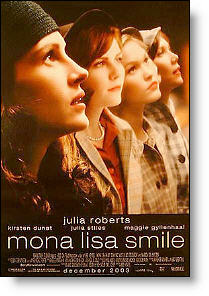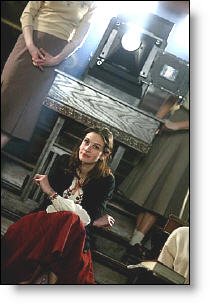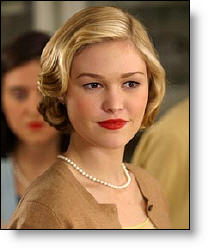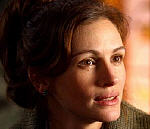Mona Lisa Smile
 for sexual content and thematic issues.
for sexual content and thematic issues.
Reviewed by: Rosemarie Ute Hoffman
CONTRIBUTOR
| Moral Rating: | Average |
| Moviemaking Quality: |
|
| Primary Audience: | Adults Mature-Teens |
| Genre: | Drama |
| Length: | 1 hr. 57 min. |
| Year of Release: | 2003 |
| USA Release: | December 19, 2003 |
| USA Release: |





how the role of women in society has changed
marriage in the Bible
Is formalized marriage becoming obsolete? Answer
Some people are convinced that traditional marriages don’t work and that this practice should be abandoned. What does the Bible say about marriage?
lesbian lover / What’s wrong with being gay? Answer
What about gays needs to change? Answer
It may not be what you think.
Read stories about those who have struggled with homosexuality
domineering mothers
fornication and adultery
SEXUAL LUST—What does the Bible say about it? Answer
TEMPTATIONS—How can I deal with temptations? Answer
CONSEQUENCES—What are the consequences of sexual immorality? Answer
| Featuring |
|---|
| Julia Roberts, Julia Stiles, Kirsten Dunst, Juliet Stevenson, Maggie Gyllenhaal |
| Director |
|
Mike Newell |
| Producer |
| Elaine Goldsmith, Elaine Goldsmith-Thomas, Paul Schiff, Deborah Schindler |
| Distributor |
| Revolution Studios |
Julia Roberts (“Pretty Woman”) has certainly done well in portraying a liberal in this film saturated with an obscure sense of what women’s roles ought to be. Throughout the film, you will find a mixture of harlotry and affairs, while women try desperately to remove the corset of the 1950s our society has deemed “freeing” in this era.
Screenwriters Mark Rosenthal and Lawrence Konner have done a remarkable job. The stories of each individual intertwine as they experience life in their own way. Julia Stiles (The Bourne Identity) is superb when challenging Julia Roberts’ character in a face-off regarding the choice of career or marriage.
Katherine Watson (Julia Roberts) who portrays a bohemian from California is a newcomer to Massachusetts’ Wellesley College, which has a long lineage of being one of this country’s top liberal arts colleges, as well as a leader in the education of women. Katherine arrives with dreams of her own and a passion to make a difference in the lives of those she teaches. As an art professor, she has some tough work ahead, as she finds these women of the 1950s stuck in tradition and in need of some coaxing on the road of personal fulfillment, which is taboo.
After an angelic church hymn chanted in the cathedral, it is recited at the opening school day and sets the tone, “Who knocks at the door of learning? I am every woman. What do you seek? To awaken my spirit through hard work and dedicate my life to knowledge.” Katherine finds out on her first day of instructing that her students have read and memorized the entire text. However, they fail in preparing to consider Art, and form their own opinions. Also, the school office worker tells her that she was not the first choice for the teaching position of History of Art 100. Overall, Katherine’s fear catches up with her and failure begins to visit, but not for long.
Katherine along with the school nurse are branded for their subversive behavior. Katherine decides to implement unconventional methods of teaching. Off campus, she introduces her students to Modern Art in a warehouse while the school nurse (Juliet Stevenson) is reprimanded and discharged for distributing contraceptives to students. Furthermore, the nurse’s reputation of being homosexual follows her. Both women are considered progressive, forward thinkers, and a threat to Wellesley’s traditionalists.
Katherine’s long distance boyfriend on a visit to chilly New England proposes to her, but it is a brief engagement as Katherine declines with silence. It seems a committed relationship is not on her agenda. Shortly after, there is an unexpected twist, and she finds herself involved with an infamous Italian professor who is known for having sex with multiple students. In her defense, Katherine does ask him to be monogamous and wants his word on it. In the end, she finds that he has put up a front regarding his background as a solider. This once Italian-speaking war hero, who has traveled abroad, has been found out to be a language military man and served his time in New York on Long Island for the entire campaign.
Independence oozed from Katherine, which frightened most of her students, but what was once offensive to them, quickly becomes appealing as their lives unravel. The student’s independence leads them to feeling and imagining for themselves—something they were unfamiliar with, but eager to experiment. Ironically, Katherine’s dreams do not include marriage, while this is the first and foremost goal of every student she teaches.
The students invite Katherine to a secret girl party and she accepts wanting to connect. Under oath and during a game of “Truth or Consequences” Katherine opens an old wound and speaks of her first love, Patrick, who also goes by the name Leo. They were eighteen and engaged. He was sent overseas to Pearl Harbor, and she further explains, that everything and everybody changed after that. With other confessions from the girls and the affects of the war, Katherine adds that Leo married another and she went to graduate school. She ends in round one with some strong blanket statements, that not every relationship is meant for marriage and that women should not plan their lives around marriage.
After a derogatory column declaring Katherine’s war on the Holy Sacrament of Marriage, Katherine decides to expose the women to the type of advertising of their era. She takes this approach to reveal the true reality of women’s roles. The photo slides show women reciting poetry while pressing their husband’s pants. She further refutes the journalistic piece that demanding excellence was not to be confused with challenging the roles you were born to fill—being a wife and mother. She had no idea she was signing up for tomorrow’s wives, instead of tomorrow’s leaders.
Kirsten Dunst who marries during the school semester was not ostracized for missing classes on campus, and her grades were not to be compromised because marriage was accepted, no matter the disruption. However, her perfect marriage quickly turned into a lonely existence. Her husband, who professed to have meetings in the evening and working, was having an affair. Kirsten’s mother was aloof to the idea of divorce and/or accepting the destruction that was occurring. While in her own pain, she was studying the well-known painting of Mona Lisa. She wondered if she was happy, even though she smiled—something she was all too familiar with.
Katherine was contracted to return the next school year, but with conditions from the college president, Jocelyn Carr. Katherine declined. She sailed to Europe to explore and seek the truth beyond tradition.
It is easy for many women to be caught up and wrapped up in the tradition of being a wife and mother, which are respectable and honoring roles. However, remember that all women are wonderfully and fearfully made. You have a future and a hope—whether you are single, married or have a career. Individually, we must seek out our own purpose, and we should not define it by cultural standards, but rather, by what is acceptable in the sight of God!
Violence: None / Profanity: Moderate / Sex/Nudity: Moderate


[Average/4]
[Better than Average/4]
[Better than Average/4]
[Better than Average/4]
[Better than Average/4]
[Average/2]
Stiles’ character makes the decision, despite her education and promise of a career in law, to pursue the traditional role of housewife. Roberts’ character is furious. This scene has great dialogue and presents the choice of traditional housewife role in a very respectable manner.
What I like best about the film is that it really gives you big clues as to the WHYs of the feminist movement. If one understands that many feminists are women afraid of being vulnerable to social injustices, you’ll find clear social injustices littered about in the film. I think this film greatly supports Galatians 6:7—Whatsoever you put into the ground, that you will also reap. Sowing has everything to do with reaping. Objectionable material of course. Implied that a male teacher had sex with his students, casual sex, drinking, smoking, etc. Overall, enjoyable, but offensive implications to the Christian worldview underneath some scenes.
[Average/3]
[Very Offensive/1]
[Average/1]
[Average/2]
Somewhere in this propaganda piece, where good is called evil, and evil good, there is a story. I’m not entirely sure what that story is, but the message is: if you want meaning in life, love and happiness, don’t bother with morality, and especially not Christian morality.
Moral rating: Offensive / Moviemaking quality: 3
[Very Offensive/3]
[Better than Average/5]
[Average/4]
My Ratings: [Average/4]